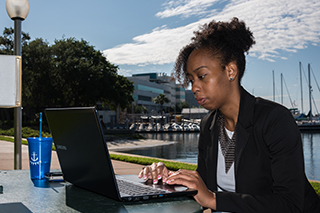Undergraduate Major
The Educational Studies program prepares students to engage in educational settings beyond the classroom, where teaching and training are an integral part of the organization. Students in the Educational Studies program learn the skills, methods and strategies of a successful teacher, but employ them at a range of organizations and fields. The program does not lead to teacher certification. If you are interested in the program that does lead to teacher certification, you can visit here for more information.
DEGREE OPTIONS
The College of Education offers a B.S. in Educational Studies on the St. Petersburg campus.
View more information about education options on the USF Tampa and Sarasota-Manatee campuses.
Educational Studies AT USF ST. PETERSBURG

The demand for teaching and education skills outside of the classroom are very high. The Educational Studies degree leads to careers in education for individuals at a variety of institutions. Because the degree is broad-based and interdisciplinary, there are a plethora of job possibilities. If you know what career you’d like, you can usually cater the degree to your interests. You can get jobs in public or private educational institutions, nonprofits, business or corporate jobs, and service organizations. You can work in educational policy, law, or program development. You can go on to graduate school or teach in private schools. Whatever the case may be, the Bachelor’s in Educational Studies is a degree that opens many possibilities.
Graduating with an Educational Studies major will give you the tools of integrating and applying systematic knowledge to helping individuals and institutions. The research component provides a valuable asset to just about every educational endeavor, as the need for assessment grows more every day. The degree will also empower you to lead within educational institutions and among children and youth for positive change.
Individuals who pursue the Educational Studies degree do so because:
- They seek to engage in educational contexts other than the traditional classroom.
- They use the degree as a building block for graduate studies such as a Master of Arts in Teaching or MA in Counseling.
- They are exploring the field of education but are unsure of career direction.
- They want to teach in a private school setting and do not need state certifications.
Though the program doesn’t lead to a teaching certification, it provides flexibility for students to change paths, since coursework is nearly identical to the Education (with ESOL and Reading Endorsement) bachelor’s degree.
Coursework, coupled with internships and field experiences, develop exemplary teachers and other educational personnel for roles in a diverse and changing educational landscape. Students are required to participate in three internships during their degree program, each becoming more involved and intensive, enabling students to integrate theory with teaching practice. Students in the program have conducted internships at Great Explorations Children’s Museum, the Boys and Girls Club, outdoor education programs and more.
The Educational Studies program pedagogical approach is inclusive of special and elementary education. Graduates will have the knowledge to work with students from a wide range of backgrounds and who have different needs. The St. Petersburg campus is also home to the STEM INQ lab, allowing aspiring educators and current faculty to infuse the latest in science, technology, education and math into teaching methods. The lab is rich with multidisciplinary tools, including 3D printers, AutoCAD and virtual and augmented reality to enhance experiential and inquiry-based models of learning.
The Educational Studies degree is currently a hybrid program.
potential careers in educational studies
- Private education
- Nonprofit leader
- Museum education
- Organizer
major requirements for educational studies
Always refer to the Undergraduate Catalog for degree requirements. Students will normally begin progress toward the major by taking at least one course from the major core, as these often serve as prerequisites for the electives. Students are urged to consult with the entrepreneurship advisor to create the most beneficial set of courses.
QUESTIONS?
For questions about this program, contact an Academic Advisor.